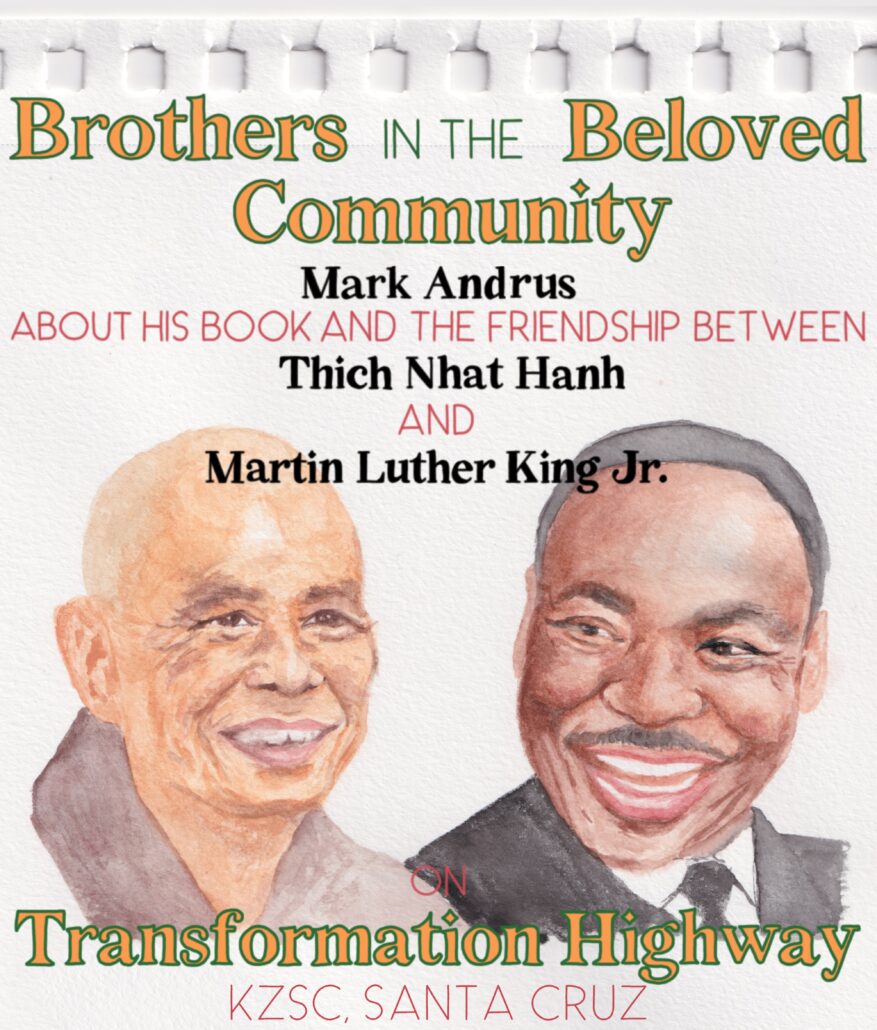Art by Hannah Rouland (IG: @hannah.tor.art)
John Malkin speaks with Marc Andrus about his new book that was recently released by Parallax Press, “Brothers in the Beloved Community: The Friendship of Thich Nhat Hanh and Martin Luther King Jr.”
In sermons, speeches and writings Martin Luther King Jr. often emphasized that, “The way of nonviolence leads to the Beloved Community.” (Ebony Magazine, 1959 “My Trip to the Land of Gandhi”) And in his 1963 “Letter from a Birmingham Jail” King wrote, “Injustice anywhere is a threat to justice everywhere. We are caught in an inescapable network of mutuality, tied in a single garment of destiny.”
At the same time on the other side of the planet, Thich Nhat Hanh was a Buddhist monk in Vietnam helping victims of the devastating U.S. war on his homeland. Nhat Hanh traveled to the U.S. in 1966 to build peace between the U.S. and Vietnam and he and King collaborated towards peace, justice and the Beloved Community until King’s assassination in Memphis on April 4, 1968.
The powerful union of these spiritual revolutionaries is illuminated in a new book by Marc Andrus, “Brothers in the Beloved Community: The Friendship of Thich Nhat Hanh and Martin Luther King Jr.” (Parallax Press) Andrus is the eighth bishop of the Episcopal Diocese of California and the book is based on Andrus’ 2020 PhD dissertation in the Philosophy, Cosmology and Consciousness Department at the California Institute of Integral Studies in San Francisco.
On May, 31, 1966 King and Thich Nhat Hanh held a press conference in Chicago and released a statement that read in part, “The enemies of those struggling for freedom and democracy are not man. They are discrimination, dictatorship, greed, hatred and violence…” In 1967 King nominated Thich Nhat Hanh for the Nobel Peace Prize. Now 95 years old, Nhat Hanh has written over one hundred books including “Peace is Every Step” (1990) and “Living Buddha, Living Christ” (1995). In 2014 a stroke left him partially paralyzed and unable to speak and in 2018 he returned to Vietnam.
In 2019 Andrus visited Thich Nhat Hanh and his monastic community in Hue, Vietnam at the Tu Hieu Temple where Nhat Hanh had first became a monk in 1942 and developed Engaged Buddhism.
.
.
Birth pangs
Q: “Martin Luther King Jr. and Thich Nhat Hanh both integrated social activism with spiritual practice. They recognized our interconnection with each other. Martin Luther King Jr. said, ‘The arc of the moral universe is long, but it bends towards justice,’ and, ‘There is a genuine civilization that is struggling to be born.’
A: “That comes from King’s Nobel Peace Prize speech in 1964 and I think it’s so brilliant,” Andrus said. “He takes that from the New Testament, but he made it his own. It’s staggering to think about the suffering and oppression he experienced in 1963 and 1964 and then was able to say, ‘This is not meaningless. In fact, these are the birth pangs of a new society.’ It takes a spirit that is so profound and daring. Many people are giving up as we’re experiencing climate grief and the dissolution of a democracy. All this is going on. But is it possible for us to see that we’re still in these birth pangs?”
Beloved community is interconnection
Q: “Tell me about this term Beloved Community that signifies interconnection and active compassion.”
A: “If we use the term interconnection for the Beloved Community, then what you would say is that Thich Nhat Hanh adds to that, the idea of interpenetration (the Buddhist understanding of Emptiness). Interconnection and interpenetration become recognized in Thich Nhat Hanh as two primary aspects of the Beloved Community, meaning that everything is connected to each other and that the whole resides in every part of the whole,” Andrus explained. “That’s the interpenetration part and it’s a very profound part of understanding Beloved Community. So, anybody that receives the Beloved Community through Thich Nhat Hanh’s teaching is receiving this much enriched vision, which is both interconnection and interpenetration.”
Emptiness
Q: “In Buddhism interpenetration is often called Emptiness or mutual causality and recognizes that everything exists in relation to everything else.”
A: “Emptiness, as Thich Nhat Hanh understands it, is not about abstraction. It’s about engagement,” Andrus said. “It’s about knowing that the boundaries are meaningless between you and me. And even between me and the people who oppress me. His mindfulness is going in and going out at the same time. To be in community is hard work. It’s also deeply satisfying. But Gandhi’s idea of Swaraj – self-rule – is not the same thing as ego freedom. I think this is hard for Americans because we have a culture that solves towards ego freedom. That’s a very shaping narrative.”
Deep vow
Q: “After King was killed on April 4, 1968 Thich Nhat Hanh continued his dedication to building the Beloved Community.”
A: “There’s this extraordinary statement that Thich Nhat Hanh made in 2014, reflecting on Martin Luther King Jr’s assassination and the effect it had on him. He says, ‘I was devastated. I couldn’t eat, I couldn’t sleep. And I made a deep vow.’ He makes a deep vow to continue what Martin called the Beloved Community,” Andrus explained. “And he says, ‘I have kept that vow to this day. And I believe that Martin has supported me all this time.’
“Since King’s assassination in 1968, we see so many things he’s done to maintain the Beloved Community; peacemaking between Vietnam and the United States, work with boat people, environmental work and gender equity,” Andrus continued. “But what is he most known for? When he returned to Vietnam (2018) Time Magazine says, ‘The monk who taught the world mindfulness is going home.’ So, I thought, ‘Well, what if that’s it?’ What if that’s the primary, central thing that he would say he was doing to maintain the Beloved Community? That’s a very big deal. It’s available to everybody. It’s so essential that we develop our own spiritual practices, and that our spiritual practices are not removing us from the world as the young Thomas Merton’s were. But practices that actually immerse us in the world.”
Self immolation: Buddhist martyrs
Q: “Thay – as Thich Nhat Hanh is referred to in his meditation community – and King only met twice in person but their union was profound. During that period King expanded the civil rights movement to include the anti-war movement, a move that wasn’t well-received by many activists.”
A: “King got a lot of pushback for that,” Andrus said. “Their meetings were precipitated by Thay writing to King an open letter that was an explanation of the self-immolations of monks and nuns in Vietnam. Those self-immolations had been conceived by journalists and people in the West as suicides. Thich Nhat Hanh wanted King and all the readers to know, ‘These are not suicides. They’re the opposite.’ No, these were the embodiment of courage and purpose. Acts of total commitment. King understood that from his own tradition, as a person who understood Jesus as a prophet.
“The night before King was assassinated, he invoked that language in his last sermon; ‘I’ve been to the mountaintop.’ He’s invoking Moses and he’s saying, ‘I’m willing to face the cost.’ A person who puts themselves in the sites of the Empire knows that with each step they take faithfully, they’re moving closer to their own destruction,” Andrus continued. “They know that the Empire will take no pity on people who oppose it.
“So, what’s the difference between a monk or a nun who sets fire to themselves out of total commitment and the Christian prophet who takes one more step in opposition to the Empire? King saw that they were the same,” Andrus explained. “There’s a statement they made after the Chicago press conference (May 31, 1966) about the immolations, ‘These were martyrs.’ He’s identifying the Buddhist monks and nuns who are burning themselves to death as martyrs, putting them in this very important category for Christians. It’s the equivalent of Thich Nhat Hanh saying to Martin in Geneva the last time they met, ‘In Vietnam they call you a great Bodhisattva.’ They’re recognizing each other across these religious differences. It’s amazing. And that is how the relationship starts.”
Thich Nhat Hanh in Vietnam
Q: “Tell me about your Spring, 2019 trip to visit Thay in Vietnam.”
A: “I decided I was just going to go,” Andrus said. “The day I was flying out of San Francisco, I got an email from Sister Chan Khong. She said, ‘Stay at this place across the street from our convent.’ I rented a room there and I would bicycle back and forth each morning and afternoon. It was an amazing 10 days. I spent most of every day with the sisters and they were so welcoming and gave me dozens of hours of interviews. I would arrive at about 5:30 in the morning and we would do walking meditation and then breakfast. Then work and more meditation after lunch. And then I would do interviews with people in the afternoon and bicycle back to the hotel. One day we were doing morning walking meditation and Thay joined us with a group of monks. They were moving him in his wheelchair. I walked with him and then I went over to the monastery and sat with him for an hour. That was the time I had with Thich Nhat Hanh. It was a way of witnessing my respect for him and being in his presence. So, it was transmission by presence. It was very precious.”
Listen to this interview with Marc Andrus at noon Thursday on “Transformation Highway” with John Malkin on KZSC 88.1 FM / kzsc.org.


